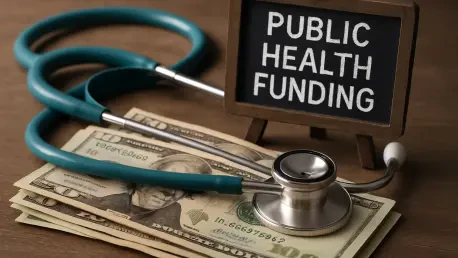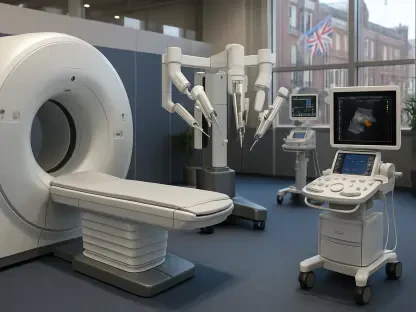In the heart of New Orleans, a small HIV outreach ministry faces an impossible choice: cut essential supplies like condoms or lay off staff who keep the operation running, reflecting a broader crisis rippling across the United States in 2025. Behind closed doors, Russell Vought, director of the White House Office of Management and Budget (OMB), has reshaped federal funding for public health, wielding obscure budget tools to delay or cancel critical support. From measles outbreaks in Texas to halted maternal health research nationwide, the consequences are dire and often unseen by the public. This story uncovers how one man’s decisions are unraveling the safety net millions depend on, raising urgent questions about power, accountability, and survival.
A Hidden Crisis Unfolding in Public Health
The foundation of public health in America—federal funding—has become a battleground, with Vought at the center of a seismic shift. Under the Trump administration, his control over the OMB has allowed him to manipulate the flow of dollars that states, clinics, and communities rely on for everything from disease prevention to emergency response. Many Americans remain unaware of these behind-the-scenes maneuvers, yet the impact is staggering, leaving vulnerable populations exposed to preventable health risks.
This crisis often hides in the shadows of complex budgetary processes, far from the headlines of political debates. Delays in funding have led to tragic outcomes, while entire programs vanish under layers of red tape. As local health systems scramble to adapt, the gap between need and resources widens, threatening the very fabric of community well-being.
Why Vought’s Budget Power Affects Every Citizen
Public health funding is not a distant policy issue; it touches every corner of society, from urban centers to rural towns. When Vought delays or withholds these funds, the effects cascade through hospitals, clinics, and emergency services, disrupting care for the most vulnerable. A single missed allocation can mean the difference between a contained outbreak and a widespread epidemic, impacting families regardless of income or location.
Beyond immediate health concerns, Vought’s actions challenge a core democratic principle: Congress’s constitutional authority over federal spending, often called the “power of the purse.” This overreach by the executive branch raises alarms about unchecked power, as critical decisions bypass legislative oversight. In a time when health disparities continue to grow, the ability to deliver timely services becomes a matter of national importance, affecting every citizen’s safety.
The stakes are even higher during recurring health crises, where rapid response is essential. With Vought’s influence altering the landscape of federal support, the question looms—how can communities trust that help will arrive when it’s needed most? This issue transcends politics, striking at the heart of collective security and resilience.
Tactics That Undermine Vital Health Programs
Vought’s approach to federal spending has unleashed chaos in public health through deliberate, often hidden strategies. One key tactic is the use of apportionments, releasing funds in small, controlled batches rather than as a whole. During a 2025 measles outbreak in West Texas, delayed CDC funding contributed to two child deaths, as state officials waited months for resources that could have saved lives.
Another method involves canceling grants or shortening application windows, crippling programs before they can even start. Housing assistance initiatives, for instance, have teetered on the brink of collapse, with advocates noting that unissued funding calls for 2025 risk evictions for thousands. Bureaucratic obstacles, such as multiple sign-offs and stalled reviews through entities like the Department of Government Efficiency, have frozen essential research, including national surveys on maternal and infant mortality, halted for months on end.
These strategies often align with ideological priorities, targeting programs tied to diversity or equity. HIV clinic hours in New Orleans have been slashed, and dementia care training at Louisiana State University was canceled, illustrating a pattern of damage across varied health needs. Each move chips away at the infrastructure meant to protect public welfare, leaving lasting scars on communities.
Voices from the Ground and Expert Warnings
The real-world toll of these budget cuts emerges vividly through the stories of those on the front lines. Tamachia Davenport, who runs an AIDS outreach ministry in New Orleans, describes the heartbreak of prioritizing staff over vital supplies like condoms, a decision that heightens risks for HIV patients already struggling. Such choices reflect the impossible dilemmas faced by underfunded programs across the nation.
Experts in law and policy amplify these concerns with sharp critiques of Vought’s methods. Gillian Metzger, a constitutional law professor at Columbia University, argues that this level of control over funds erodes Congress’s fundamental budgetary role, labeling it a democratic crisis. Robert Gordon from Georgetown University points to a calculated approach of letting funds lapse to justify deeper cuts, a strategy embedded in Vought’s broader plans to dismantle federal agencies.
The silence from the administration on these issues only deepens the frustration. Health providers and advocates report a chilling effect, fearing retribution if they speak out about funding delays. This combination of personal hardship and systemic critique paints a troubling picture of intentional disruption, with little room for accountability or dialogue.
Steps to Navigate the Fallout and Build Awareness
Confronting the scale of Vought’s impact on public health funding may seem overwhelming, but tangible actions can make a difference for communities and advocates. A starting point is to research specific programs at risk in local areas—be it HIV care, outbreak response, or maternal health studies—and engage with representatives to demand clarity on how federal dollars are being allocated. Transparency is the first step toward change.
Supporting coalitions that push for legislative protections offers another avenue for impact. Many groups are working to restore congressional oversight of spending, echoing efforts by Democrats on appropriations committees to safeguard public health budgets. Joining these initiatives, whether through donations or grassroots lobbying, can help shift the balance back toward public need over ideological cuts.
Finally, amplifying the voices of affected communities remains crucial. Sharing stories from places like Texas and New Orleans through social platforms or local forums can pressure policymakers to act swiftly. Collective action, grounded in education and advocacy, holds the potential to refocus national priorities on protecting health and well-being, countering the quiet erosion of vital resources.
Reflecting on a Crisis That Shaped Lives
Looking back, the disruptions caused by Russell Vought’s budget maneuvers left an indelible mark on public health across America. Communities bore the brunt of delayed outbreak responses, reduced clinic services, and canceled research, with vulnerable populations suffering the most. The erosion of congressional authority over spending stood as a stark reminder of how fragile democratic checks could be when tested by executive overreach.
Moving forward, the path to recovery hinges on stronger legislative safeguards to ensure funds reach those in need without interference. Public health coalitions and local leaders must continue to demand accountability, pushing for reforms that prioritize lives over politics. Beyond policy, fostering a national dialogue about the value of health infrastructure could prevent such crises from recurring, ensuring that future generations inherit a system built on resilience rather than ruin.









